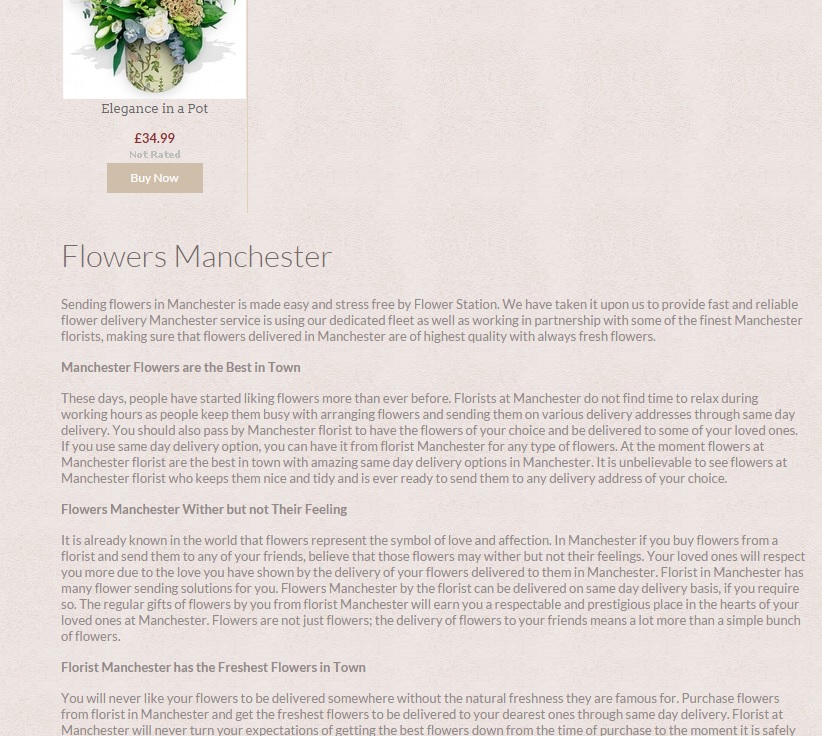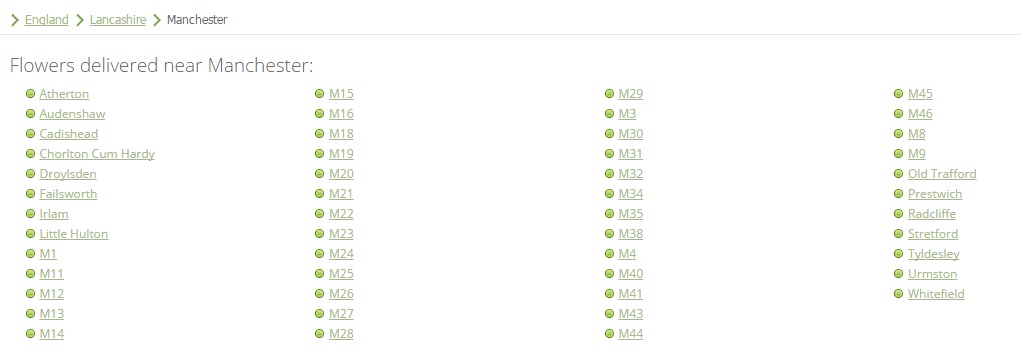It is likely that your business has a large percentage of target searchers using the location of the city or suburb with the keyword in their search.
So for example, Mr Ferguson might be thinking about making his better half feel special so wants to have some flowers delivered to her work (or he might be in the bad books and looking to make amends!). He lives in Mosman, a suburb in North Sydney so he might search for:
- ‘Flower Delivery Mosman’
- ‘Flower Delivery North Sydney’
- ‘Flower Delivery Sydney’
Great, someone is searching for the thing you sell and you deliver to that location. In fact you deliver to the whole of Australia! Problem is, your business operates purely online and doesn’t have any physical locations… so how do you capture more people searching for what you sell in their chosen location?
Create Optimised Location Pages On Your Site… But Stay On The Right Side Of The Search Engines
To capture search traffic from people typing in ‘Flower Delivery North Sydney’, you probably need a page on your site that is optimised around that location and related keywords.
You might already be using this strategy and if you aren’t then you’ve no doubt seen it being used either as a visitor or when doing competitor research. More often than not though, this common SEO tactic is abused. First let’s look at how to effectively create location pages that actually provide value to the visitor (meaning you should stay on the right side of the search engines).
It’s important to note that if your business does have a physical store, then great! Search engines want you to create a page for the store and on it you can list the address and contact details, opening times and general information about the store. You can also create associated Google My Business listings for this store and list it in relevant online directories.
Ex Google Spam Assassin Matt Cutts even posted it on his own blog: https://www.mattcutts.com/blog/give-each-store-a-url. The post is dated but still relevant.
If your business doesn’t have a physical store in that location, then creating location pages can often be seen as a direct attempt to manipulate Google’s algorithm so you need to always create value and a good user experience. Most of all you need to make the content RELEVANT to the location and your business.
So if we want to increase our search presence around ‘flower delivery North Sydney’ type keywords, then we should create a page that talks about and is optimised around ‘flower delivery North Sydney’.
The content on that page could talk about things like:
- Brief history of your business operating in this location
- Average delivery times
- Trends – time of year, types of products
- Offers – any particular promotions for the location
- PR – any local media coverage could be showcased
- Big One: Customer feedback, testimonials, reviews, photographs, product photographs etc
- …and of course some products that you want them to buy or a product finder – your call to action
If this page is struggling to rank for target keywords then you might need to create some more content on your site that relates to ‘North Sydney’ (probably in the blog section), with internal links back to the target ‘flower delivery North Sydney’ page. You might also want to focus marketing activity around that location for a period.
So look to create PR opportunities in North Sydney (with any online coverage, preferably linking back to the North Sydney location page you just created), reach out to any local bloggers or communities, leverage any existing relationships you might have in the area to generate links and awareness, run competitions for people in that area…. you get the idea.
This extra activity should send great signals to the search engines that your business is relevant to the area and the search and they should reward you for this by sending you more traffic. More importantly though is the audience.
“Never lose sight of the audience in favour of gaming a search engine. Audiences build businesses so this should always be ‘front of mind’ in your digital marketing activity. Just remember to keep the search engines ‘in mind’ so you get the best of both worlds!” 🙂
~Scott Pittman
Tip:
Don’t lose too much sleep over your ranking for a single location.
It is likely not worth enough to your business to invest significant resources to achieve page one positions for the single location. Search engine algorithms change constantly, especially around location based search. So if you did invest significant resource for the sole purpose of having that page appear on page one, there is a risk that it might one day be replaced by a different result… or everyone will stop using Google and start using a new service, or something else.
This goes back to the sentence above of ‘audience first’. Investing greater resource to better connect with audiences in that location and grow your brand (with search engines in mind) will generate long term business ROI.
Don’t Create Location Pages With Regurgitated, Empty Content
One tactic commonly used in this strategy is to just create pages with regurgitated content that doesn’t offer any value for the reader. Basically the site usually has countless location pages with the same rehashed/rewritten content on every page but with the location keywords shoehorned in the text. The example below illustrates this:
I’m not saying this doesn’t work, it quite often does and pages such as these currently litter search engine results for many location based keywords. My advice: Play the long SEO game.
Google is getting better and better at detecting low quality pages or direct attempts to manipulate its algorithm. Despite the low effort, low quality tactics for location pages currently working in many cases, you can be sure that at some point, probably in the not so distant future, that these types of pages will be removed from the search results. Your entire site might also get a penalty which could seriously affect your revenue.
These low quality location pages can be seen as ‘Doorway Pages’ and you can read Google’s own definition of these pages here.
Don’t Be Greedy And Try To Grab Every Single Location Possible
Some SEOs or business owners get greedy with location pages and try to gain search share for every single possible location.
This again can be seen as a direct attempt at manipulating the algorithm and just how much value and relevance can you really provide to people with your location page if you go too granular? All those pages below could be wrapped up in less than 10 pages. It’s overkill and once again, it might work now and for a while but it’s likely not a long term strategy and could carry a penalty.
Takeaways:
- If your business has physical stores then definitely create pages for them on your site and optimise the pages around relevant keywords for that location
- If your target market searches using the location in the keyword then consider creating location pages to capture more of this traffic and increase search presence
- Always create value and don’t go too granular
- Consider local marketing (online and offline) and PR activity where applicable


